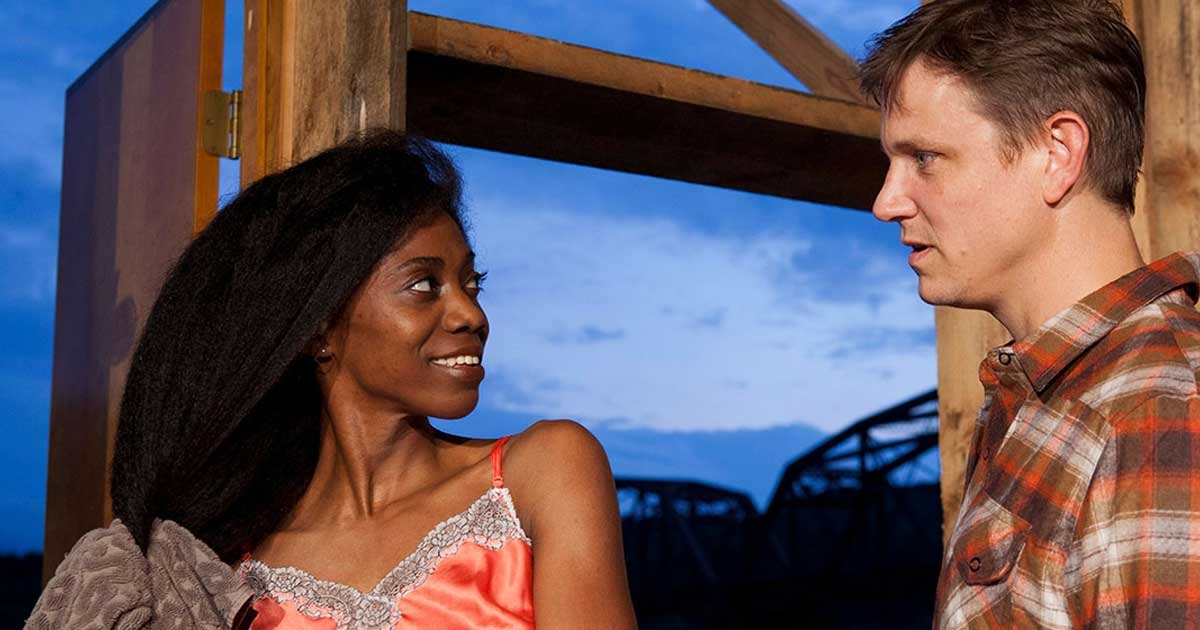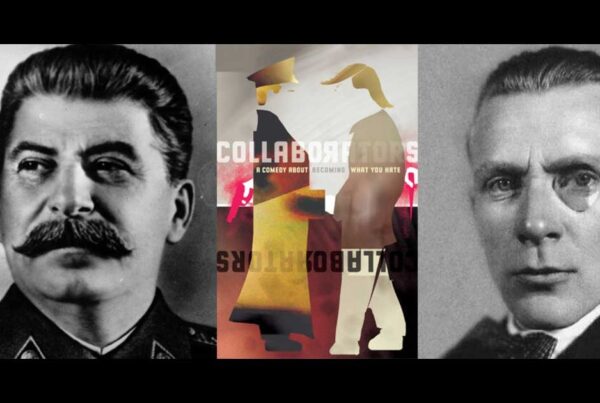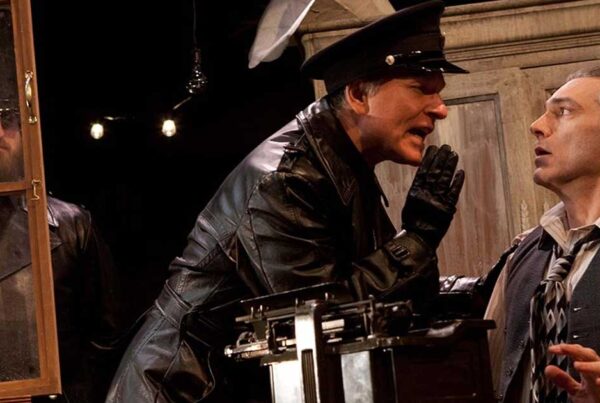
Pittsburgh Quarterly – In Richard Brautigan’s classic surrealist novel, Trout Fishing In America, the narrator visits a store selling trout streams by the foot. They are stacked in piles like pieces of lumber, each length corresponding to a different price.
In Jez Butterworth’s 2012 play The River, produced by Quantum Theatre, it’s as if they picked out a 20-foot piece of stream from this store and slapped it onto the stage. This construct is ignored at first—the actors literally hopping over it—and the audience is forced to wonder whether it’s one of many surreal conceits. But then it is not ignored. And that is what makes this drama so absorbing: we are presented with information and action that may be illusionary or may be real. It’s the same challenging dilemma the New Wave cinema directors gave us with their shifting perspectives, and it seems the best way to view this production is just that — like a film.
The River plays with time and memory in an unapologetic fashion, jump-cutting the two unnamed female characters in and out with scene transitions as if they might be the same person. Imagine the relativity of Alan Ayckbourn’s Taking Steps, but instead of condensing the physicality of space, we are witnessing the compression of emotional time.
Director Adil Mansoor makes this work brilliantly and, though we may not always know exactly what is transpiring, we are never confused. It’s like looking at a Stuart Davis painting: for every degree of abstraction there is a degree of concrete identity, anchoring our faith in that what the artist is doing is really allowing us to see something deeper than what either a completely abstract or a literal depiction would reveal.
The three primary actors are all strong and consistently so, which is essential to the success of such a performance: if the enjambed scene transitions revealed any stitching they would utterly fail. None of the characters are given names, and hence are always referred to in the second person, which creates a sense of ambiguity.
It also allows for the blurring of identities, which becomes the main trope of this drama. We first encounter the characters played by Daina Michelle Griffith and Andrew William Smith enjoying a vacation in Smith’s cabin by a trout-filled river. They appear to be new lovers. Yet Griffith addresses him in the past-tense more than in the present, recounting in great detail events of that morning, as if they happened long ago. The second-person voice is used as a psychological dredging tool, much as it is in the film Hiroshima mon amour, which also involves a love triangle that fuses past and present, and one lover with another.
After Griffith goes into another room, Siovhan Christensen’s character appears, or is it a reappearance? The action continues, the recounting continues, the trout stream is still running through the cabin, nothing else has changed, and yet somehow, we feel that time has passed in a significant way.
The two female characters continue to enter and exit the stage, usually through the same door, and even begin to dress similarly. Their flow of dialogue with the male character questions the idea of temporality: are we in the now, or are we in the past, especially when we are in love? (Butterworth is obviously a huge fan of Harold Pinter). If you’ve ever had a relationship with someone who couldn’t get over his or her past relationships, then you will find much resonance in this work. In fact, I heard several audience members murmuring such recognitions as they exited the theatre.
The language is lyric, and even poetic in places. Sound designer Steve Shapiro complements this with a delicate reed and flute theme, and then achieves spectacular irony as Smith scales, guts, and cooks a large trout, listening to Miles Davis’ gorgeous “Blue in Green”. This evolves into the kind of seduction scene Hemingway’s Nick Adams would truly appreciate.
Quantum’s utilization of in situ locations has the stage sitting next to the Allegheny River which is certainly picturesque, but unfortunately, also happens to be next to a railroad trestle. When trains pass, which happens several times during the show, the blasts are so loud they drown out the actors. If ever a production offered a Brechtian alienation device, this is it.
Britton Mauk’s set puts us right in one of those Hemingway short stories where you can smell the fishing nets and gear drying on pegs in the walls. The trout stream running through the cabin does eventually come alive and evolves into something integral to the story.
For all the excellence of the writing and the staging, Griffith, Smith, and Christensen deserve immense credit for turning an ethereal premise into transformational theatre. The highest compliment I can give to this production is perhaps the rarest—the audience comes away with a genuine and personal reaction. Whether you take what happens in The River as literal, or surreal, the experience is transcendent.




